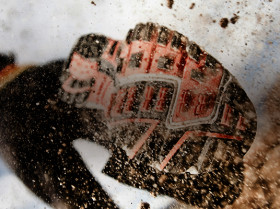Last week, a reader on my Facebook page who is not an educator asked for examples of questions to ask a PE teacher on parents’ night. I was pumped. It’s so important for parents to be health advocates for their child - at home and at school. Picking and choosing some of the following questions might help you learn more about your child’s physical education experience. Yet, the list is far from exhaustive. I could write a separate post related to active transportation and appropriate levels of screen time, for example.
Without further adieu, here are some helpful questions for parents to ask. Beneath each question are additional comments that I felt necessary to include. Feel free to share them on your personal PE blogs if you teach PE and/or with parents far and wide.
What physical skills and skill combinations are being taught and how can I reinforce them at home?
The response will depend on age and development level. It’s important that children are taught the fundamental movements and that they begin to combine the movements in Grades 2-4. During the later elementary years, students should be applying these skill combinations in more complex ways. As much as possible, these skills are taught through authentic (real life settings) practice to increase fun and opportunity to gain skills.
How do you assess students, and how often do you assess them?
Ideally, you will hear words such as formative daily assessment. Formative assessment is ongoing assessment. It’s used by teachers to give students skill-specific feedback on maintaining or improving skills. Students should always know they are being assessed and should know what the teacher is looking for them to demonstrate.
Are you assessing all learning domains: physical, cognitive, and affective?
Physical education is a class where the whole child is considered and nurtured. This includes not only what they can demonstrate in the physical domain, but also if they know how to transfer the skills and knowledge to their life outside of school. Additionally, skills such as effective collaboration, communication, and risk-taking are taught and assessed in a solid PE program.
Do you teach sports as their own entity or small-sided modified versions of sport?
It is a very traditional mindset to teach adult version of sport in a PE program. It simply doesn’t belong. Too few students have the opportunity to develop skills when this is the case. Instead, students should experience small-side, modified versions of sport. This version could be presented within an instructional model such as Teaching Games for Understanding (TGfU).
What is your balance of activities that you use to teach skills and understanding between dance, games, gymnastics, and other pursuits?
Individual curriculum will determine mandates around categories of activities, however traditional programs have far too heavy an emphasis on games than the other categories. It is important that students gain skills in a variety of activities to increase their skills as well as increase the likeliness that each student finds an activity that she/he loves.
Is my child positive and effective in collaborating with others? What successes or areas for improvement do you suggest I talk to her/him about related to teamwork?
Collaborating and teamwork are important life skills. Physical activity environments present a unique way to teach these skills. Ask the teacher about these skills as a way to practice or model them within a family unit.
Will students be exposed to skill development on a variety of surfaces (land, snow, ice and water) to best support their physical literacy development? If not, how might the PTO or community support your program so that students gain diverse experiences and are afforded opportunity to get out of the gymnasium?
Physical education isn’t called gym class, or shouldn’t be, anymore, for many reasons. A gymnasium is one space in which PE is taught. But, if only taught in this one space, think about how many skills aren’t taught. Skating, surfing, swimming, snowshoeing, orienteering, geocaching, hiking, biking…the list goes on. If you want to increase skill offerings in your child’s school, see how you might be able to rally up some other parents who can make it happen. I have observed first hand the power of an inspired group of parents at the school level.
If my child is excelling or struggling, how are you differentiating your teaching to meet his/her needs?
We all learn differently and we all bring strengths and weakness to experiences. It’s important to understand how your child’s needs are being met. Ideally, you can share some tips that work for you and gain some insight on what is working well for the teacher. Either way, the child wins.
Do you work classroom teachers to weave classroom content into PE lessons? If so, how so?
I find that teaching PE lessons with classroom content makes classes more relevant to students, and they feel I have superpowers because I know what they are up to when they aren’t on my watch. It’s fun to plan in an interdisciplinary way, and it’s fun to teach in this way. A PE teacher shouldn’t do this in lieu of the PE content, she/he should teach this way in an effort to make learning more meaningful for students.
How are students required to demonstrate that they understand why this content is important? How do they put it into action?
It’s one thing to teach students a skill, it’s another⎯better⎯thing to teach them how to use it in multiple ways and why to use it in multiple ways when they are not in PE class. Empowering students to put understanding into action will only make the world a better place.
I encourage you to make time to visit your child’s PE teacher and to support their physical literacy journey.







At Open House and during parent-teacher conferences, I give my students’ parents a half-sheet flier with “10 Conversation Starters for Talking to Your Child About Physical Education.” I also post this information on my school website. Here they are:
1. Tell me what you learned in P.E. today.
2. Tell me about the best part of your P.E. class.
3. What was the most challenging thing you did in P.E. today?
4. What skills are you working on in P.E.?
5. What are you doing differently from last year?
6. Tell me how we can incorporate your learning in P.E. into a family activity/outing.
7. What was the best thing your teacher asked you to do in [activity] today?
8. Did any of your classmates do anything funny?
9. Who did you play with today?
10. Can you show me (or teach me) something you learned today?
Thank you for sharing your questions, Amanda. I would love to combine your questions with mine next school year. I’ve found that parents appreciate having some prompts available (I just print them out and put them on the table), just in case they don’t know what to say.
Love these! I agree that parents don’t know what to ask and may resort to how they were taught in P.E. which might degrade what their student is learning. Thanks so much for sharing these!
Glad that Sarah so kindly shared her list of questions on this blog and thrilled that you all think it’s as great as I do! Be sure to find the post Sarah and I did on the blog on Standards-Based Grading in Physical Education: https://www.movelivelearn.com/motivating-students-beyond-passfail
Sarah–I’m on the Gopher Advisory board and would love to use this article as a blog post. I’m required to write a blog post every couple of months. Would love to use this article!!! May I use. I’ll definitely give you credit and reference it!! Let me know. Find me on twitter at PEberingmx
I love a parent discussion with kids!!!
Sarah, this is an awesome list! Love it and thanks for sharing. Everyone reading, you can find Sarah on twitter at: @GHSaysRockChalk. She’s really worth following and always sharing new ideas and asking great questions to make sure we are all moving forward in reaching our potential as educators.
I was just thinking of doing something like this for open house nights and the like. Great ideas. I have parents that are always asking why their kids don’t talk more about PE other than it’s fun. I’ve asked the parents to talk to their kids, ask them questions. Now I can use something like this as started kit for the parents and families. Thanks!
Thanks for your comment Daniel! You always share great ideas on twitter and ask great questions. Folks can find you there at: @danielrinman. I appreciate your comment and welcome you to share this post with your students’ parents!
Amanda-I’m on the Gopher Advisory board and would love to use this article as a blog post. I’m required to write a blog post every couple of months. Would love to use this article!!! May I use. I’ll definitely give you credit and reference it!! Let me know. Find me on twitter at PEberingmx
Love that!
Hi Michael! Of course you may share this blog post as far and wide as you wish! Thanks for the interest! I appreciate your linking it back to the site so that those who read it might find other things they also like under the Physical and Health Education category of the blog! I encourage everyone to follow you on twitter: @PEberingmx – you do great work!
Thank you! Also, thank you for your high praise! I truly appreciate it!
I would love to have something like this to hand out!!! Love it!!!
Go for it, Mandy! Feel free to print the blog off or simply email parents the link if that makes life easier for you! Whatever you wish works for me – the key is gaining more parent/guardian advocates for their child’s health. :)
This is a wonderful article Amanda! I plan to use your questions with Sarah ‘ questions to put out to parents. Thanks so much!
You are very welcome, Katie! Really thrilled that you find it useful. The person who requested it is a friend who I met through sport when I was about 14 years old. I’m so glad she asked for this resource as it’s seeming to be something many others wanted, too! :)
Perfect timing Amanda! Just about to head into conferences this week and I’ll be sending this out to the parents to challenge not only me, but their student! Our kids should be able to answer these questions too. That’s when you know you have a solid PhysEd concept and mission.
Awesome! Thanks for commenting and so happy you might find this useful! :)
[…] week, a reader on my Facebook page who is not an educator asked for examples of questions to ask a PE teacher on parents’ night. I […]
Thank you for this Amanda! I am going to be prepping the answers to these questions and giving them to parents at PTC. I think many parents just don’t know what to ask, and this is a great way to get the conversation started! It is also a great way for me to reflect on my teaching and to make sure I can answer these questions with confidence as well! :)
Thank you, Kate! I love how you are choosing to use the blog to best fit your needs. That’s awesome!